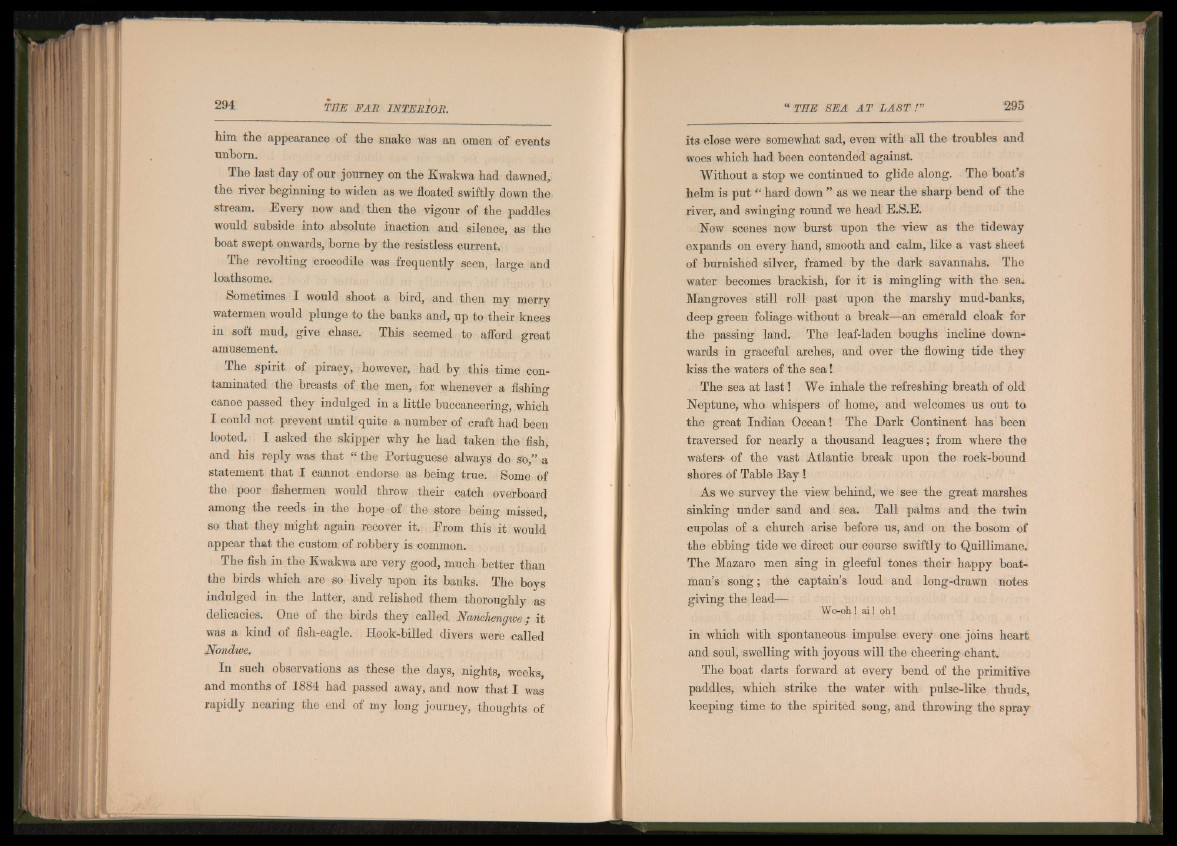
him the appearance of the snake was an omen of events
unborn.
The last day of our journey on the Kwakwa had dawned,
the river beginning to widen as we floated swiftly down the
stream. Every now and then the vigour of the paddles
would subside into absolute inaction and silence, as the
boat swept onwards, borne by the resistless current.
The revolting crocodile was frequently seen, large and
loathsome.
Sometimes X would shoot a bird, and then my merry
watermen would plunge to the banks and, up to their knees
in soft mud, give chase. This seemed to afford great
amusement.
The spirit of piracy, however, had by this time contaminated
the breasts of the men, for whenever a fishing
canoe passed they indulged in a little buccaneering, which
I could not prevent until quite a number of craft had been
looted. I asked the skipper why he had taken the fish,
and his reply was that “ the Portuguese always do SO,” a
statement that I cannot endorse as being true. Some of
the poor fishermen would throw their catch overboard
among the reeds in the hope of the store being missed,
so that they might again recover it. Erom this it would
appear that the custom of robbery is common.
The fish in the Kwakwa are very good, much better than
the birds which are so lively upon its banks. The boys
indulged in the latter, and. relished them thoroughly as
delicacies. One of the birds they called Nanchengwe; it
was a kind of fish-eagle. Hook-billed divers were called
Nondwe.
In such observations as these the days, nights, weeks,
and months of 1884 had passed away, and now that I was
rapidly nearing the end of my long journey, thoughts of
its close were somewhat sad, even with all the troubles and
woes which had been contended against.
Without a stop we continued to glide along. The boat’s
helm is put “ hard down ” as we near the sharp bend of the
river, and swinging round we head E.S.E.
New scenes now burst upon the view as the tideway
expands on every hand, smooth and calm, like a vast sheet
of burnished silver, framed by the dark savannahs. The
water becomes brackish, for it is mingling with the sea.
Mangroves still roll past upon the marshy mud-banks,
deep green foliage without a break—an emerald cloak for
the passing land. The leaf-laden boughs incline downwards
in graceful arches, and over the flowing tide they
kiss the waters of the sea!
. The sea at last 1 We inhale the refreshing breath of old
Neptune, who whispers of home, and welcomes us out to
the great Indian Ocean 1 The Dark Continent has been
traversed for nearly a thousand leagues; from where the
waters- of the vast Atlantic break upon the rock-bound
shores of Table Bay I
As we survey the view behind, we see the great marshes
sinking under sand and sea. Tall palms and the twin
eupolas of a church arise before us, and on the bosom of
the ebbing tide we direct our course swiftly to Quillimane.
The Mazaro men sing in gleeful tones their happy boatman’s
song; the captain’s loud and long-drawn notes
giving the lead—
Wo-oh! a i! oh I
in which with spontaneous impulse every one joins heart
and soul, swelling with joyous will the cheering chant.
The boat darts forward at every bend of the primitive
paddles, which strike the water with pulse-like thuds,
keeping time to the spirited song, and throwing the spray